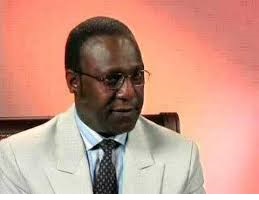WardheerNews editorial
The death of Professor Omar Enow, on December 2, 2016, is a major loss for Somalia and for the often overlooked Somali-Bantu history, in particular. Not only was he the voice of the voiceless, but also a tireless campaigner for a new school of thought about Somali Studies; he promoted a vision that Somalia was a heterogeneous nation. He demanded the expansion of a tent called Somali whose history and political arrangement excluded a large section of its own citizens only because race and ethnic origin.

As a young lone academician who hailed from the Somali-Bantu group, Enow had to rise to the opportunity to tell his people’s story—a story replete with racism less known by outsiders. Telling the Bantu history required a personal gut and a professional browse to challenge the prevailing myth among students of Somali studies that for decades felt comfortable with a distorted history of homogeneity of the Somali people.
In one of the early days of the Somali Studies, Enow stood up in a 1980 conference in Mogadishu and forcefully spoke about the plight of Somali-Bantu and their status as a marginalized and discriminated group. Until then, it was a well-kept secret by Somalis, a secret acquiesced by dominant culture that denied and lied about the rightful of the Somali-Bantus in Somalia.
The Jareer Weyn, as the name was later popularized, represented thousands of Somalis who have historically inhabited the land between the country’s two rivers and worked as farmers. Some of them were brought as slaves hundreds of years ago from Mozambique and Tanzania. Others were already in Somalia, but were poorly treated by their Somali brethren due to their Negroid features and the low social status assigned them further alienated their determination to assimilate. The Jareer Weyn largely worked as indentured slaves, domestic laborers, and as farm workers. Being a non-Hamitic, Somali- Bantu, i.e., Jareer Weyn, was never easy in Somalia. It meant being an eternal outcast.
Professor Enow left two legacies that would prove impossible to erase. He was perhaps the first Somali scholar who brought the issue of the Somali Bantu to other Somali and non-Somali scholars’ attention. His theoretical construct was simple and straight forward – not all Somalis look the same (i.e. Hamitic), and not all Somalis are treated equally. He slapped us with the undeniable truth that, unlike the popular belief, there are many Somalis of different origins.
With this plain and evident truth, Enow demanded that the Somali tent be expanded to host all of its diverse groups. He dictated to us the “inconvenient truth” that Somalia is multi-ethnic and multi-cultural and heterogeneous political entity, and as such demanded that Somali history be rewritten to acknowledge and accommodate our own “inconvenient truth.” He was a revisionist at its best.
To this day, the Somali-Bantus are ostracized; they are assigned a low social status and inter-marriage between them and other Somalis is discouraged. In many ways, they are treated as a lower caste people. With Enow’s legacy, the indomitable new generation of Jareer Weyn has tools to write their own history within the Somali context
He will also be remembered for his advocacy in protecting the life of thousands of Bantus. At the outbreak of the Somali civil war in 1991, Bantu Somalis were victimized where thousands of innocent civilians were killed and displaced. Following a massive displacement of Bantus, Enow campaigned hard by lecturing and participating at academic conferences. He succeeded to have the Bantus be recognized as a distinct social group that needed special protection; they were quickly recognized as refugees where they were classified, and often their cases were expedited, as refugees for resettlement in the United States.
Enow was a scholar, member of the now defunct Erogo-Canada chapter, Somalis Studies and the African Studies Association (ASA). On personal level, he was clear in who he was. Unlike many Somalis, he had no identity crisis, and never negotiated about his being an African. Politically, he was critical of Somalia’s membership of the Arab League and had pleaded with fellow brethren to make up their minds in which group they belonged: Arabs or Africans. He was a unique voice and will greatly be missed. RIP.
WardheerNews
Email: [email protected]
—–
Read more: WDN editorial archives
We welcome the submission of all articles for possible publication on WardheerNews.com. WardheerNews will only consider articles sent exclusively. Please email your article today . Opinions expressed in this article are those of the author and do not necessarily reflect the views of WardheerNews.
WardheerNew’s tolerance platform is engaging with diversity of opinion, political ideology and self-expression. Tolerance is a necessary ingredient for creativity and civility.Tolerance fuels tenacity and audacity.
WardheerNews waxay tixgelin gaara siinaysaa maqaaladaha sida gaarka ah loogu soo diro ee aan lagu daabicin goobo kale. Maqaalkani wuxuu ka turjumayaa aragtida Qoraaga loomana fasiran karo tan WardheerNews.
Copyright © 2024 WardheerNews, All rights reserved


